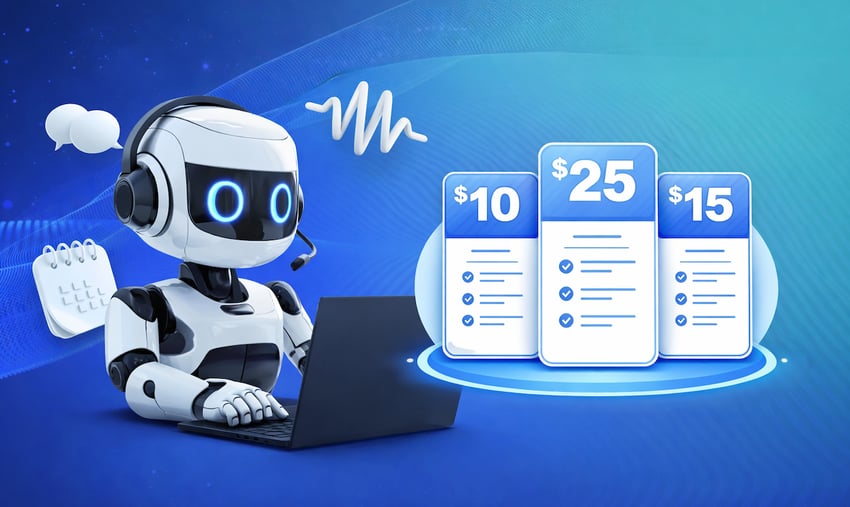Whether customers call in, send emails, text messages, or slide into a brand’s DMs, businesses need an agile customer communication management software that provides a convenient and effortless customer experience.
Our guide to customer communication software breaks down the top 10 options to help you find the best fit for your business.
We’ve included features, capabilities, pricing, and pros and cons so you can start providing integrated customer communications today.
Key Takeaways
We’ll go into the details down below, but for now, here are our top 10 picks for customer communication management platforms:
- Nextiva: Best customer communications platform for most businesses
- Front: Best for small businesses
- Intercom: Best for live chat communication
- Zoho Desk: Best for reporting and analytics
- Help Scout: Best for small and mid-sized businesses
- Zendesk: Best for customizations
- Salesforce Service Cloud: Best for sales and marketing teams
- Freshdesk: Best for Integrations
- Quadient Inspire: Best for enterprises
- Hiver: Best for email communication
How We Evaluated the Software
To choose the best customer communication management (CCM) platforms that consistently balance functionality with ease of use, we assessed a range of solutions based on what matters most to businesses.
Our selections were guided by these criteria:
- Core capabilities such as omnichannel messaging, template design, automation, and CRM/ERP integrations
- Ease of adoption, including set-up requirements, configuration flexibility, and integration with existing systems
- Pricing clarity and overall value for organizations of different sizes and industries
- Customer feedback and ratings from trusted sources like G2 and Capterra
- Versatility of use, from small businesses sending routine communications to large enterprises handling complex, regulated messaging
What Is Customer Communication Management Software?
CCM software is a tool that helps businesses create, manage, and deliver consistent and tailored responses across multiple communication channels (email, SMS, print, social media, etc.).
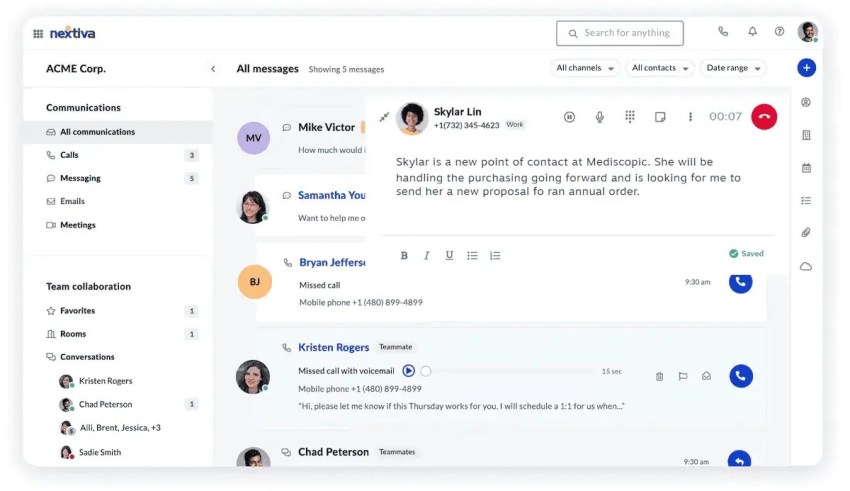
This software can handle complex outbound communications such as:
- invoices
- account statements
- appointment reminders
- marketing materials
- claims correspondence
The convenience lies in its ability to quickly organize, automate, and improve every customer interaction so you can be sure that your business’ messages are timely, relevant, consistent, and compliant.
Because they support compliance, CCM solutions can even handle content containing sensitive account or transaction data. This makes it perfect for businesses in financial services, healthcare, insurance, telecom, and government.
With a top software solution, you can provide your customers with a much better experience which, in turn, encourages loyalty in your brand.
Benefits of CCM Software
Here are a few key benefits of using customer communication management software:
- Improve customer experience: Customer communication software improves customer experiences by providing personalization, faster responses, and consistent communication across their preferred channels while offering self-service options through integration with knowledge bases and FAQs.
- Better insights: Customer communication software provides better insights by analyzing customer interactions. It offers valuable data on behavior and preferences, which businesses can use to enhance segmentation, personalize marketing, and identify improvement areas.
- Increase efficiency and productivity: CCM software increases efficiency and productivity by optimizing business processes, automating repetitive tasks, and streamlining workflows. This enables teams to collaborate effectively and manage customer interactions more efficiently.
- Deliver faster service: Customer communications management software can help support teams deliver faster service by automatically routing inquiries to the most qualified agent and providing omnichannel support. This allows businesses to assist customers efficiently across phone, email, and chat channels.
- Provide consistent communication: CCM software ensures consistent communication by using standardized templates for uniform messaging across all communication channels, reducing errors through automated workflows, enhancing accuracy, and minimizing customer frustration.
How Customer Communication Management Software Works
Here’s how this software works. Depending on your business needs and customer preferences, some of these features may be more or less important to you:
- Omnichannel communication: CCM software enables businesses to manage and deliver communications seamlessly across various channels, such as email, phone, SMS, social media, live chat, and physical mail. This omnichannel support approach allows customers to choose their preferred method of interaction for a more convenient experience.
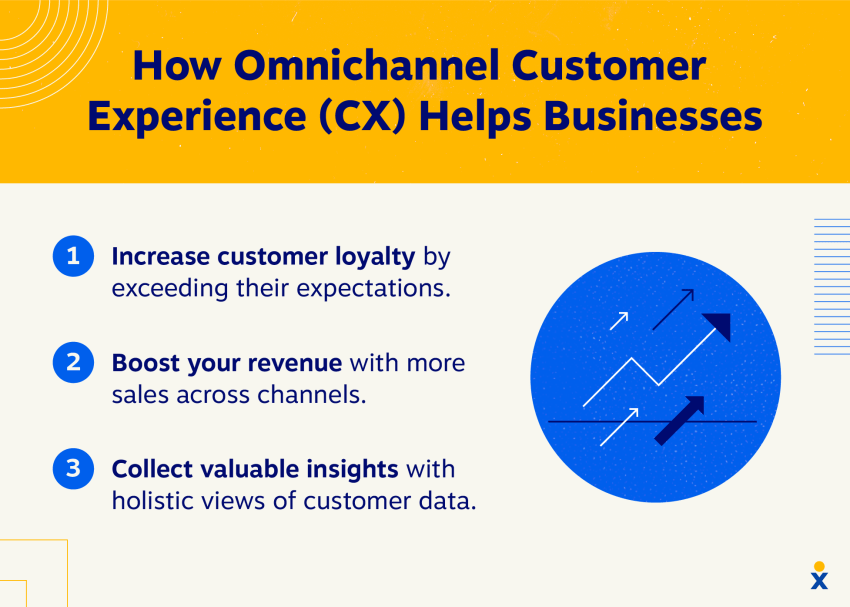
- Centralized data management: CCM software centralizes each customer interaction across different channels into a single location and view of the customer journey, eliminating the need to search through multiple systems. This centralization simplifies data analysis and reporting, so that you get more accurate insights. Additionally, it enhances data security and compliance by maintaining a unified repository for customer information.
- AI and automation: CCM software leverages AI in customer service to automate repetitive tasks such as sending personalized welcome emails, routing inquiries to the most suitable agent, and suggesting responses to customer questions. This automation frees up agents’ time to handle more complex issues, enhances overall efficiency, and helps refine your communication strategy.
- Real-time reporting and analytics: CCM software offers real-time insights into customer interactions, including metrics such as wait times, agent performance, and customer satisfaction levels. It enables businesses to promptly identify areas for improvement, optimize their customer experience strategies, and make data-driven decisions to enhance service quality and efficiency.
- Integrations: CCM software integrates with various CRM systems, marketing automation tools, and helpdesk solutions, allowing businesses to streamline workflows and consolidate data from multichannel communications. These important integrations provide a more comprehensive understanding of customers, enhance data accuracy, and improve overall operational efficiency with your SaaS product.
Where does your CX strategy stand with AI?
Take the AI Maturity assessment to get personalized recommendations on how to enhance your CX.
Top 10 Customer Communication Management Software
Here’s a quick comparison table of the top CCM software options. Below, we’ll dive into each solution in more detail.
| Software | Best For | Features | Starting Price |
|---|---|---|---|
| Nextiva | Most businesses | Omnichannel communication Unified agent workspace AI-powered features | $15 per user per month, billed annually |
| Front | Small businesses | Shared inbox Automated workflows Omnichannel integrations | $19 per seat per month (up to 10 seats), billed annually |
| Intercom | Live chat communication | AI chatbots Live chat Customer behavior tracking | $29 per seat per month |
| Zoho Desk | Reporting and analytics | Contact management Activity management Integrated omnichannel features | $7 per user per month, billed annually |
| Help Scout | SMBs | Shared inbox Advanced permissions Custom reports | Free (limited features) for 100 contacts per month and unlimited users |
| Zendesk | Customization | Integrations marketplace AI analytics Unified omnichannel workspace | $19 per agent per month, billed annually |
| Salesforce Service Cloud | Sales and marketing teams | Case management Omnichannel routing Generative AI-powered replies | $25 per user per month, billed monthly or annually |
| Freshdesk | Integrations | Self-serve options Reporting and analytics Gamification | Free (limited features) per agent per month |
| Quadient Inspire | Enterprises | Unified design interface Centralized communication library Centralized communication hub | Price unavailable |
| Hiver | Email communication | Cross-channel collaboration Collision detection Tags and categories | Free (limited features) per user per month |
1. Nextiva
Best customer communications platform for most businesses
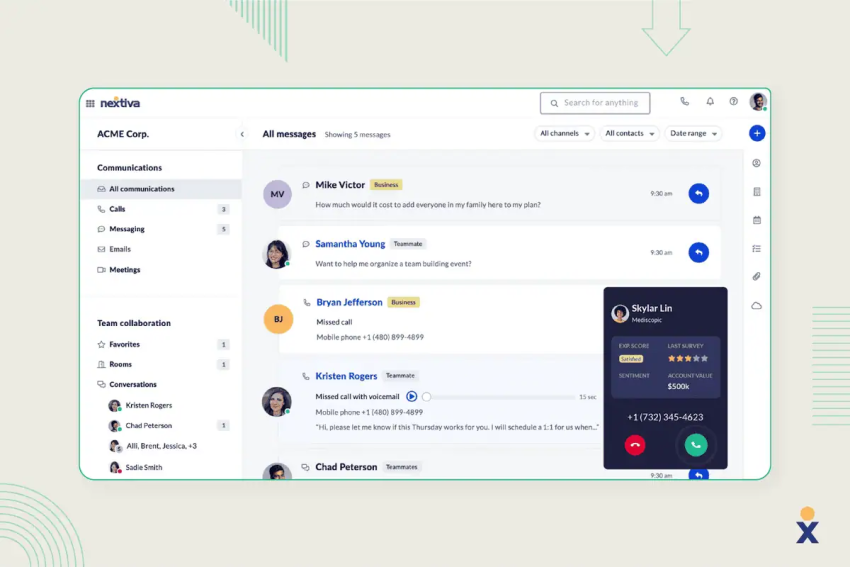
Nextiva’s intuitive customer communication solution integrates phone, video, SMS, chat, and collaboration tools into a centralized platform. This enables businesses to manage all customer interactions and communication processes in one place. By unifying these channels, your CCM platform enables you to interact with customers on demand, maintain consistent messaging, track customer interactions, and improve customer engagement and CSAT scores.
The software supports desktop, mobile app, and conference room systems, facilitating real-time collaboration with team chat, file sharing, and video conferencing. It provides analytics and reporting for better decision making, is easy to set up and scale, and offers reliable and secure service with 99.999% uptime and military-grade security. To boot, it features unlimited calling, customer relationship management (CRM) integrations, online faxing, contact management tools, notifications and alerts, and more.
Features:
- Omnichannel communication allows businesses to manage customer interactions across various channels, including phone calls, emails, SMS, live chat, and social media messaging.
- Unified agent workspace provides a central dashboard where agents can manage all customer interactions from different channels.
- AI-powered features like intelligent call routing, agent assist, and sentiment analysis boost functionalities in its CCM software.
Pricing:
Nextiva provides flexible pricing plans tailored to your specific feature requirements and preferred payment schedules. Additionally, Nextiva scales effectively alongside your business.
- Core: $15 per user per month, billed annually
- Engage: $25 per user per month, billed annually
- Power Suite CX: $75 per user per month, billed annually
Pros:
- Deep reporting and analytics dashboards
- Third-party integrations
- Unlimited voice and video calls and faxes
Cons:
- Live support limitations
- Not suitable for companies outside of the U.S.
2. Front
Best for small businesses
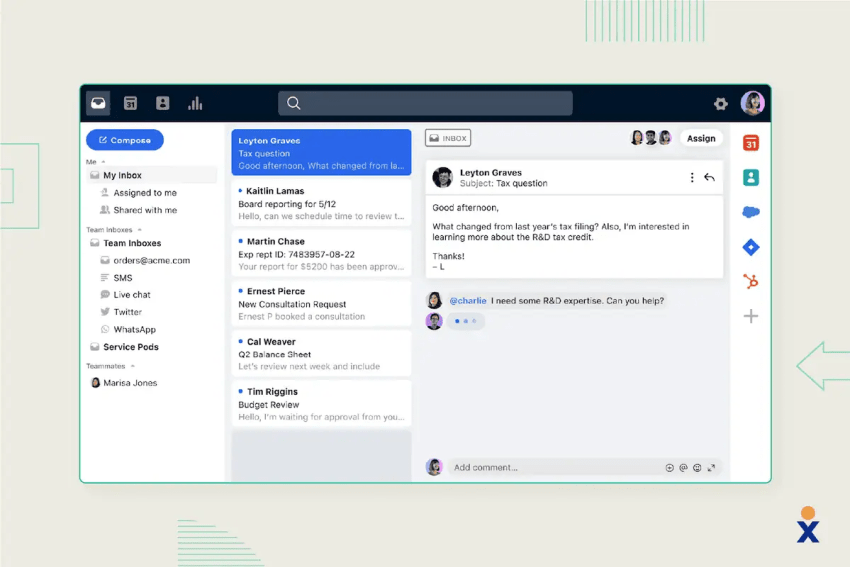
Front’s customer communication software offers a unified inbox that consolidates emails, social media, SMS, and voice messages into a single platform. It features automated routing and smart assignment to ensure messages are directed to the appropriate team member based on expertise, workload, and availability.
The software enhances collaboration with shared drafts, internal comments, and tagging while storing customer history for personalized service. It also tracks response times, satisfaction scores, and team performance to measure effectiveness and improve efficiency by eliminating the need to switch between platforms.
Features:
- Shared inboxes allow teams to collaborate through tags and notes.
- Automated workflows allow you to set up rules to automate repetitive tasks.
- Omnichannel integrations enable teams to connect additional channels and platforms.
Pricing:
- Starter: $19 per seat per month (up to 10 seats), billed annually
- Growth: $59 per seat per month, billed annually
- Scale: $99 per seat per month, billed annually
- Premier: $229 per seat per month (50-seat minimum), billed annually
Pros:
- Reporting
- Cost-effective
Cons:
- Limited support for larger teams
- Less extensive customizations
3. Intercom
Best for live chat communication
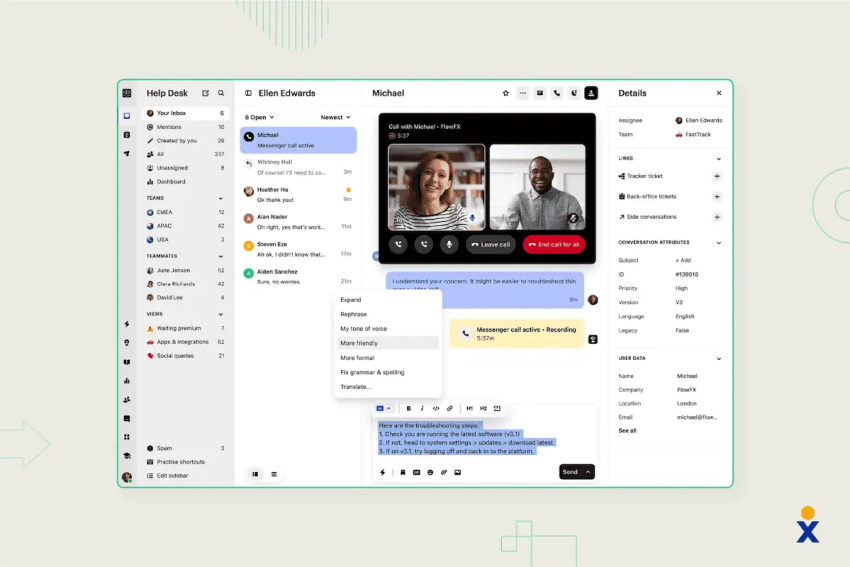
Intercom’s customer communication software facilitates seamless interactions between customers and agents with 24/7 self-service and AI-powered chatbots. It offers personalized support through AI, enhancing agent productivity and allowing for a highly customizable messaging system that aligns with your brand.
The client communication platform ensures a consistent brand experience across all customer touchpoints and features no-code customization for easy setup. Key features include automation, two-way chats, team collaboration tools, customer segmentation, user behavior tracking, self-serve support, and integrations with popular tools like Gmail, Salesforce, and Slack.
Features:
- AI chatbots can answer basic questions, qualify leads, and troubleshoot common issues.
- Live chat features allow for real-time customer conversations and immediate support.
- Customer behavior tracking allows businesses to segment and track customers based on demographics, behavior, or purchase history.
Pricing:
- Essential: $29 per seat per month
- Advanced: $85 per seat per month
- Expert: $132 per seat per month
Pros:
- Customer behavior tracking
- Customer segmentation options
- Messaging and chatbots
Cons:
- Limited integrations
- Limited automations
4. Zoho Desk
Best for reporting and analytics
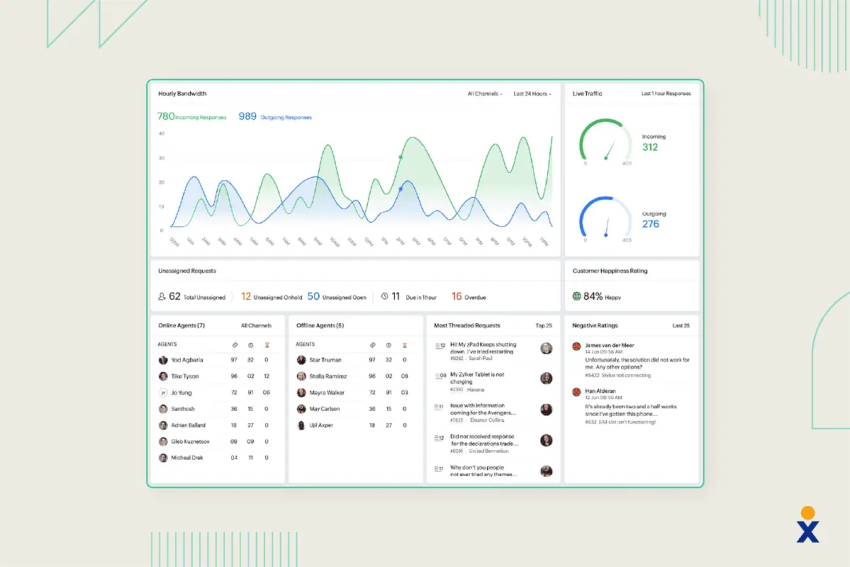
Zoho Desk’s customer communication software streamlines communication by converting emails into organized tickets and handling them in a centralized inbox for various departments. AI-powered assistance saves agent time with pre-written responses, article suggestions, and keyboard shortcuts, while storing customer data allows for personalized interactions and upsell and cross-sell opportunities.
Zoho Desk also enhances collaboration with private threads and comments, automates workflows to assign emails and notify agents, and collects customer feedback through embedded email surveys.
Features:
- Contact management stores and organizes customer information, including names, contact details, preferences, and past interactions.
- Activity management tracks and records all customer interactions across different channels, providing a complete history of communication.
- Integrated omnichannel features enable managing customer communication seamlessly across various channels within a single platform, such as email, chat, phone calls, social media, and SMS.
Pricing:
- Express: $7 per user per month, billed annually
- Standard: $14 per user per month, billed annually
- Professional: $23 per user per month, billed annually
- Enterprise: $40 per user month, billed annually
Pros:
- Real-time data analytics
- Extensive template collection
- AI-powered
Cons:
- Prebuilt integrations
- Limited support
5. Help Scout
Best for small and mid-sized businesses
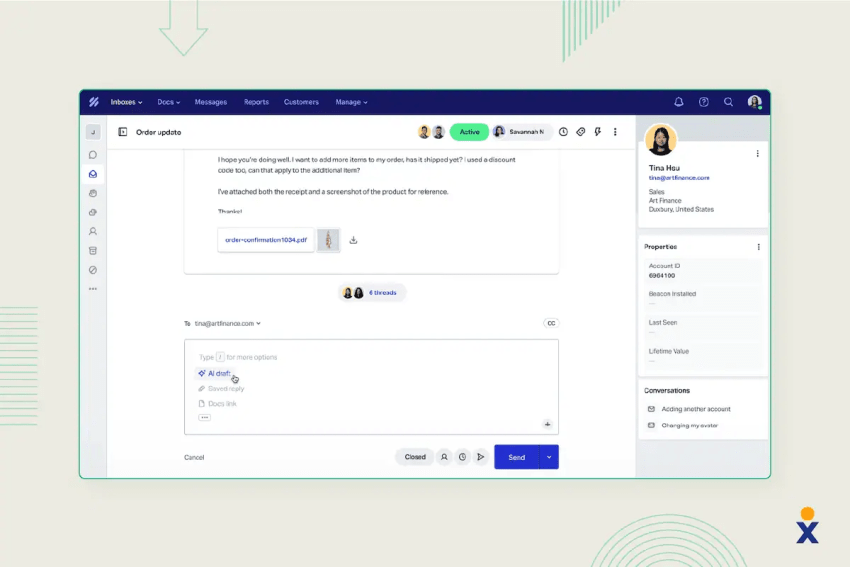
Help Scout’s customer communication platform features a shared inbox that allows collaborative email management with assignments, tags, saved replies, and private notes. Its AI-powered assist tool enhances responses by suggesting improvements and providing customer profile insights. The self-service help center is mobile-friendly and customizable, while the real-time messaging tool, Beacon, integrates chat or email options and helps articles with the shared inbox.
Features:
- A shared inbox that allows agents to reply to customers by email or chat.
- Advanced permissions that group users into teams and track them with custom fields.
- Custom reports with unlimited history provide data-driven insights.
Pricing:
- Free (limited features): for 100 contacts per month and unlimited users
- Standard: $50 for 100 contacts per month and unlimited users, billed annually
- Plus: $75 for 100 contacts per month and unlimited users, billed annually
- Pro: contact sales
Pros:
- Ease of use
- Shared inbox and collaborations
- Cost-effective
Cons:
- Limited features
- Limited integrations
6. Zendesk
Best for customizations
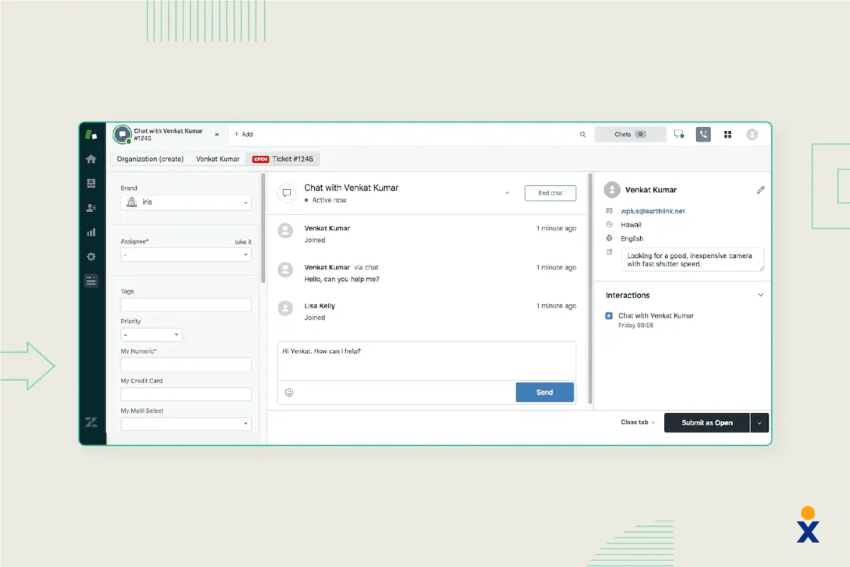
Zendesk’s omnichannel customer support solution manages communication across email, chat, social media, text, voice, and self-service channels. It offers business users a large app marketplace for extending functionality with prebuilt integrations. While it allows for custom development, this may require in-house resources or an additional budget.
Features:
- An integrations marketplace that has a robust selection of third-party apps and programs for greater capabilities.
- AI analytics provide data-driven insights into customer experiences.
- A unified omnichannel workspace provides agents with a single place to manage customer communications.
Pricing:
- Support Team: $19 per agent per month, billed annually
- Suite Team: $55 per agent per month, billed annually
- Suite Professional: $115 per agent per month, billed annually
- Suite Enterprise: $169 per agent per month, billed annually
Pros:
- Omnichannel support
- Scalability
- Integrations
Cons:
- Cost
- Steep learning curve
7. Salesforce Service Cloud
Best for sales and marketing teams
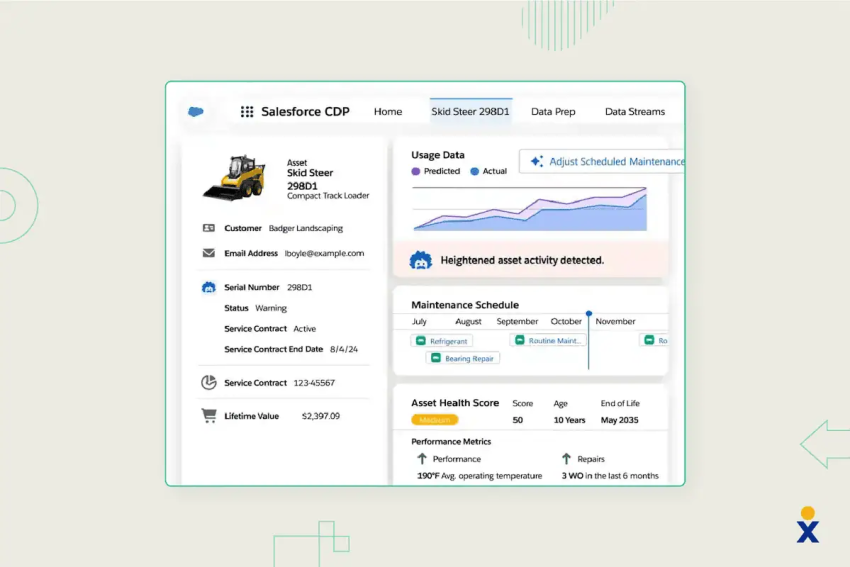
Salesforce Service Cloud is an AI-powered CRM designed for the communications industry, that helps manage the customer lifecycle from acquisition through repeat customer. It can increase revenue and ARPU with AI-powered insights and recommendations, optimize customer service by integrating data for better agent support, and enhance the customer experience by using targeted data analysis.
The platform simplifies wholesale transactions with industry-standard APIs and reduces order errors using AI. Additionally, it helps personalize the customer journey by unifying data to create tailored marketing experiences. It is all built on the robust Salesforce CRM platform.
Features:
- Case management tracks customer issues from start to finish, ensuring smooth handoffs and resolution.
- Omnichannel routing s ends inquiries to the most qualified agent based on skills, availability, or customer segment.
- Generative AI-powered replies use AI to automatically generate personalized responses to customer questions.
Pricing:
- Starter Suite: $25 per user per month, billed monthly or annually
- Pro Suite: $100 per user per month, billed annually
- Enterprise: $175 per user per month, billed annually
- Unlimited: $350 per user per month, billed annually
- Agentforce 1 Service: $550 per user per month, billed annually
Pros:
- Fully-integrated
- CRM software
- Detailed customer insights
- Service-level agreements for transparency
Cons:
- Limited automations
- Sales and marketing focused
8. Freshdesk
Best for Integrations
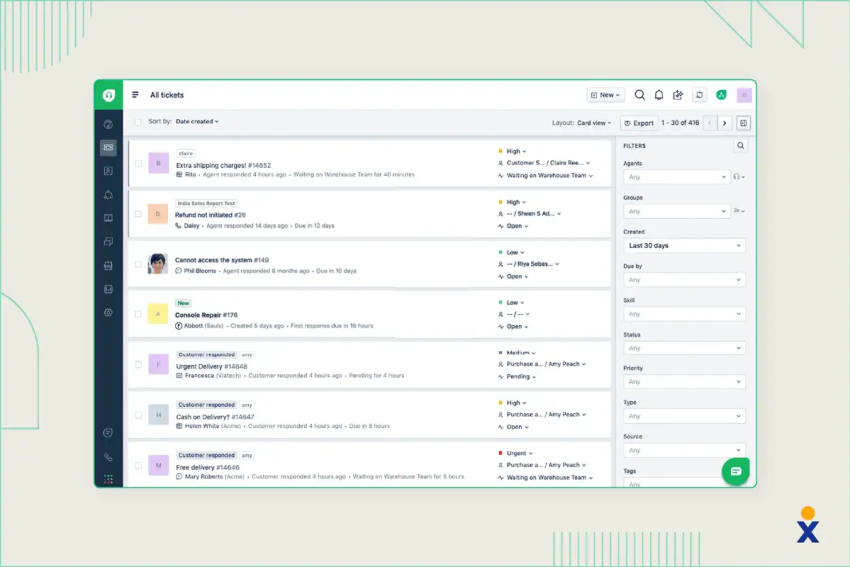
Freshdesk is a cloud-based customer service software that streamlines communication by managing traditional and digital channels in one platform. It improves agent efficiency by reducing repetitive tasks, facilitating channel switching, and tracking customer issues.
The platform offers unified reporting for team leaders, multiple self-service options for customers, and automated workflows to assign chats, calls, and tickets to appropriate agents. With a rich feature set including automations, customizations, collaboration tools, self-service options, reporting, and integrations with popular tools like Google Analytics and Salesforce, Freshdesk optimizes service delivery and agent motivation.
Features:
- Self-serve options like knowledge bases, FAQs, and multichannel support empower customers to find solutions independently.
- Reporting and analytics provide insights into customer interactions and agent performance.
- Gamification motivates agents through a game-like approach.
Pricing:
- Free (limited features): per agent per month
- Growth: $15 per agent per month, billed annually
- Pro: $49 per agent per month, billed annually
- Enterprise: $79 per agent per month, billed annually
Pros:
- Free software option with limited features
- Free trial of advanced features
- Integrations marketplace
Cons:
- The dashboard isn’t user-friendly
- Limited customizations for agent views
9. Quadient Inspire
Best for enterprises
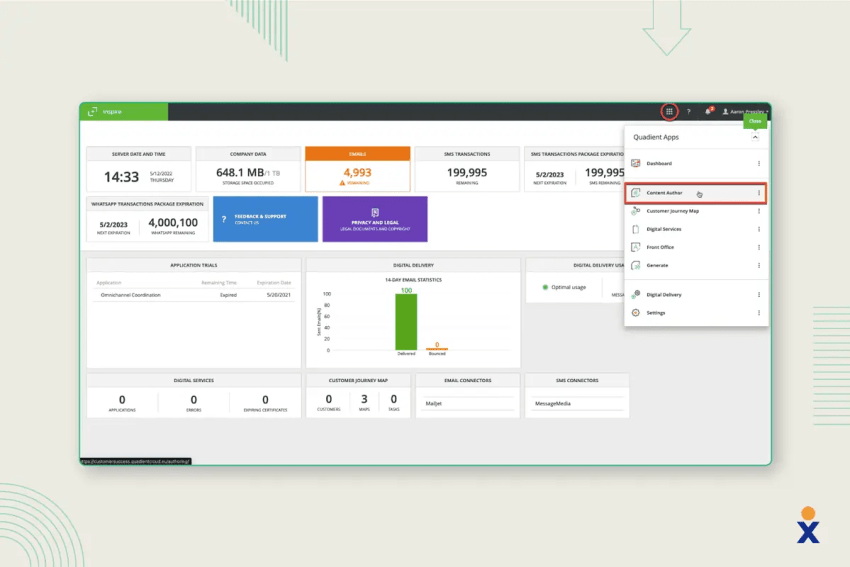
Quadient Inspire is customer communications management software designed for personalized customer communications. It offers a centralized platform to create and deliver compliant communications across all channels. It provides flexible deployment options, including on-premise, cloud, or integration with Red Hat OpenShift, and eliminates siloed systems by unifying all communication needs.
The platform features a drag-and-drop interface for easy multi-channel communication design, supports omnichannel distribution, and includes a centralized communication library for version management and compliance. Additional capabilities include customer journey mapping, real-time feedback, enhanced reporting with Microsoft Power BI, and effortless migration from legacy systems using AI and natural language processing.
Features:
- Its unified design interface provides templates for physical and digital channels using a drag-and-drop interface.
- A centralized communication library ensures compliance with all customer-facing communications.
- A centralized communication hub allows teams to manage customer communications across various digital and traditional channels from a single hub.
Pricing:
- Does not publish its pricing publicly. Contact Quadient for a custom quote.
Pros:
- Easy to configure
- Merge data into documents
- Scripting module for advanced users
Cons:
- Crash issues
- Some UI issues
10. Hiver
Best for email communication
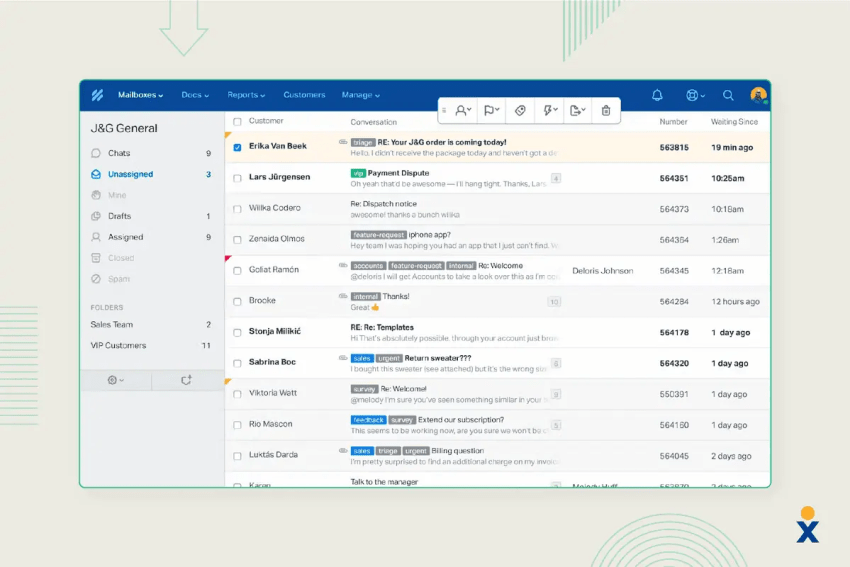
Hiver is a customer support tool that operates directly within your inbox, managing all communication channels such as email, chat, voice, knowledge base, and WhatsApp. It integrates easily with Gmail and Outlook, allowing for quick setup within an hour, and connects with various tools like Salesforce, Slack, and Aircall.
The customer communication platform supports cross-channel collaboration through team discussions and notes without additional emails and features collision detection to prevent duplicate replies. Hiver also organizes customer inquiries with tags and categories, automates workflows by auto-labeling and assigning emails, and includes an AI summarizer for quick understanding of email threads.
Features:
- Cross-channel collaboration tools allow agents to write notes and have internal discussions specific to each inquiry for a more streamlined workflow.
- Collision detection notifies team members if someone else is already replying to a customer query, ensuring clear and consistent communication.
- Tags and categories allow agents to label emails with relevant information, allowing for efficient prioritization and addressing of queries, feedback, or issues.
Pricing:
- Free (limited features): per user per month
- Lite: $19 per user per month (up to 10 users), billed annually
- Growth: $29 per user per month, billed annually
- Pro: $49 per user per month, billed annually
- Elite: Custom pricing
Pros:
- Real-time responses
- User-friendly platform interface
- Centralized inbox
Cons:
- Limited multilingual support options
- Limited automations
Challenges Businesses Might Face
Keep in mind that these challenges don’t negate the value of CCM, but they do illustrate why adopting any new tool requires careful planning and, sometimes, phased rollouts.
Here are common challenges businesses could run into when rolling out communication management software:
- Integration with existing systems: Many organizations already use CRM, ERP, or marketing automation platforms. Connecting CCM with these systems can be technically complex and/or resource intensive.
- Data migration and quality: Moving large volumes of customer data into a new CCM system often reveals duplicate or incomplete records. Cleaning and standardizing data can be a hefty task.
- Compliance and security requirements: CCM often involves sensitive data (financial, health, personal information), so complying with regulatory standards like GDPR, HIPAA, or PCI DSS requires careful planning and ongoing monitoring.
- Cost and resource allocation: Beyond licensing fees, businesses need to budget for customization, training, IT support, etc. Underestimating these costs can be a nasty surprise.
- Complexity of customization: CCM platforms can be easily adjusted, but tailoring templates, workflows, and omnichannel delivery to business needs can be time consuming.
- Measuring ROI: It can take time before businesses see results in customer satisfaction, efficiency, or cost savings. This lag can make it hard to justify the investment to upper management early on.
How to Choose the Best CCM Software
Choosing the right customer communications management system depends on your business size, industry, communication needs, and customer expectations. To make the decision easier, focus on the following factors:
1. Unified agent workspace
Look for a platform that consolidates all customer interactions across channels (email, chat, phone, SMS, etc.) into one view. This unified customer experience setup reduces the need to switch between tools, helps agents respond faster, and minimizes errors.
2. Collaboration capabilities
Look for collaboration features such as internal chat for real-time discussions, note-taking and tagging for sharing information, and escalation management for handling complex issues smoothly. This makes for faster issue resolution, improves knowledge sharing among agents, and enhances customer satisfaction.
3. Integration with existing systems
Choose software that connects with your CRM, help desk, ERP, or other business tools. Having consolidated customer data allows you to automate routine tasks like follow-up emails, access customer history in real time, and make decisions based on data-driven insights from each customer journey.
4. Reporting and analytics
Prioritize tools that provide clear performance metrics such as response times, resolution rates, and customer satisfaction. Good reporting helps you identify gaps and improve your communication strategy.
5. Compliance and security
Since CCM software handles sensitive data, confirm that the platform meets the regulatory requirements relevant to your industry (e.g., GDPR, HIPAA). Secure data handling not only reduces risks, but builds trust.
Unify Customer Communications with Nextiva
Customer Communication Management software goes beyond impressive product features by enhancing customer retention through personalized interactions. It ensures that customers and prospects feel valued throughout their interactions with your brand and the quality of their experience throughout their journey. CCM solutions identify areas for enhancement, ensuring a consistently excellent experience for every user.
Nextiva is a comprehensive CX solution for organizations seeking unified, holistic customer communication tools. With robust cloud communication capabilities, customer-centric features, and scalable, cost-effective pricing, Nextiva stands out as a top choice for enhancing customer experiences.
Provide amazing customer experiences.
Transform customer experience on a Unified CX Management platform designed to help you acquire, retain, and grow your customers.
Customer Communication Management Software FAQs
Learn more about Customer Communication Management with these frequently asked questions.
CRM software handles all aspects of customer relationships, from sales to marketing and service, whereas Customer Communication Management software specifically focuses on refining and customizing outbound communication through various channels. While CCM systems integrate with CRM to offer a unified view, its main goal is to improve communication effectiveness.
Enterprise content management (ECM) software is designed to manage and retrieve an organization’s digital content. In contrast, customer communication management software specifically focuses on customer-centric communication tasks such as creating, distributing, and analyzing interactions across different channels.
The best CCM software depends on your specific needs and budget. Some popular options cater to different requirements, so consider features like automation, integrations, and scalability when making your choice.

















 Customer Experience
Customer Experience 







